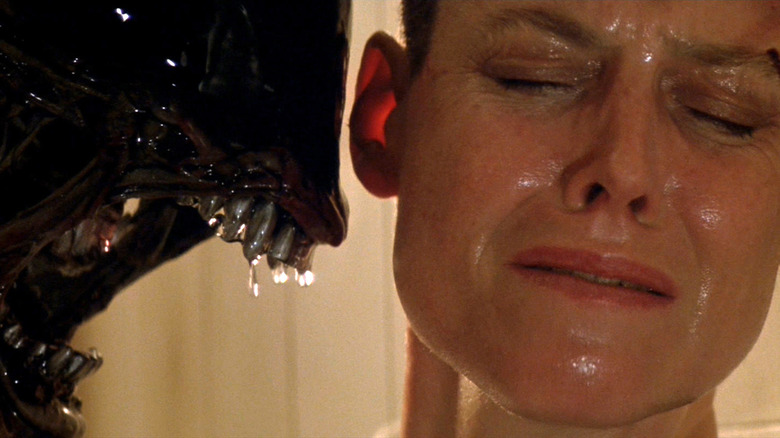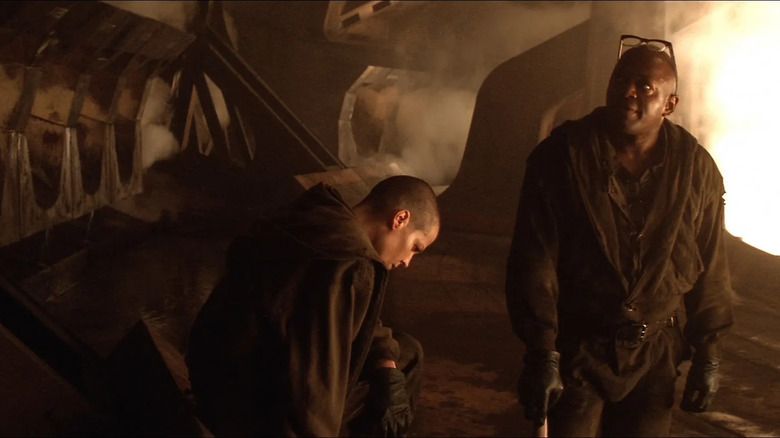Alien³ Changed David Fincher's Entire Approach To Filmmaking
David Fincher learned early on to shed his idealism. Starting in the mid 1980s, Fincher cut his directorial teeth on music videos, working for high-profile artists like Rick Springfield, Loverboy, Billy Idol, Aerosmith, Paula Abdul, The Rolling Stones, Michael Jackson, and Madonna. It was Fincher behind the videos for "Vogue," "Express Yourself," and "Oh Father." The leap to feature films seemed logical, and Fincher signed on to make a second sequel to the 1979 sci-fi hit "Alien."
Anyone who has watched the harshly but aptly titled documentary "Wreckage and Rage," or even the DVD's relatively flowerier hour-long making-of documentary about "Alien³," knows that it was rough going from the start. Infamously, scripts were drastically and repeatedly re-written from scratch, but to a degree far beyond the norm on such studio films. The film's sets were being built to match versions of the movie the studio had abandoned two drafts ago, and a lot needed to be re-worked and repurposed at the last minute. The finished product is a sloppy affair that was awkwardly received in 1992. It wasn't until the 2003 release of the "Alien Quadrilogy" DVD box set that a so-titled "assembly cut" of "Alien³" was finally cobbled together, making the film as cogent as possible given the resources.
Fincher has famously always hated "Alien³," once declaring in a BFI interview — printed in The Guardian in 2009 – that however much audiences hated the film, "no one hated it more that I did." That same interview revealed that Fincher learned a very important lesson from the nightmare production: The studio doesn't care if the movie is good. They just want it to sell.
No one has to care
One can forgive Fincher for being cynical about the filmmaking process, given how badly he feels he was hosed by the muckety-mucks at 20th Century Fox over "Alien³." In the BFI interview, Fincher recalls being around film producers and moneymen early in his career operating under the idea — eventually revealed to be a misapprehension — that making quality art was foremost on everyone's mind. When confronted with making a commercial feature film — and a sequel to an established hit, no less — Fincher learned how many decisions are made by commercial-minded execs, and how much blame said execs would lay at his feet:
"It was a baptism by fire. I was very naïve. For a number of years, I'd been around the kind of people who financed movies and the kind of people who are there to make the deals for movies. But I'd always had this naïve idea that everybody wants to make movies as good as they can be, which is stupid. So I learned on this movie that nobody really knows, so therefore no one has to care, so it's always going to be your fault. I'd always thought, 'Well, surely you don't want to have the 20th Century Fox logo over a s***ty movie.' And they were like, 'Well, as long as it opens.'"
It's long been a truth in Hollywood that businessmen call the shots in the higher echelons of cinema's decision-making processes, and genuinely creative people — if there are any — remain low in the ranks. Fincher seems to have expected a creative collaboration. What he got was constant requests for change and a game of Musical Chairs when it came to scripts.
'He's doing that again.'
The cynicism baked into the studio filmmaking process bled into Fincher as a filmmaker. In the BFI interview, he recalls having to adopt an aggressively mercenary attitude when it came to getting what you want, as well as how exactly to badger people correctly. He didn't want his complaints to go unheard, requiring a certain degree of complaint modulation, so to speak:
" ... I learned then just to be a belligerent a******, which was really: You have to get what you need to get out of it. You have to fight for things you believe in, and you have to be smart about how you position it so that you don't just become white noise. On that movie, I was the guy who was constantly the voice of 'We need to do this better, we need to do this, this doesn't make sense.' And pretty soon, it was like in 'Peanuts': [muted trombone noises]! They'd go, 'He's doing that again, he's frothing at the mouth, he seems so passionate.' They didn't care."
When the BFI interviewer asked Fincher if he had yet come around on "Alien³," Fincher was quick to answer with a "God, no!" But he also pointed out that he rarely revisits his own work once it's finished. Fincher, luckily for audiences, didn't give up on filmmaking altogether, moving from "Alien³" to the dour and nihilistic serial killer thriller "Seven" in 1995, followed by the taut, shadowy thriller "The Game" and the striking '90s essay "Fight Club." Starting with his film "The Curious Case of Benjamin Button" in 2008, Fincher also became something of an Academy darling, and his films are now regularly nominated for awards.
It's possible to postulate that Fincher the filmmaker would not have emerged as steely or as determined had he not be sharpened on the disastrous whetstone of "Alien³."


